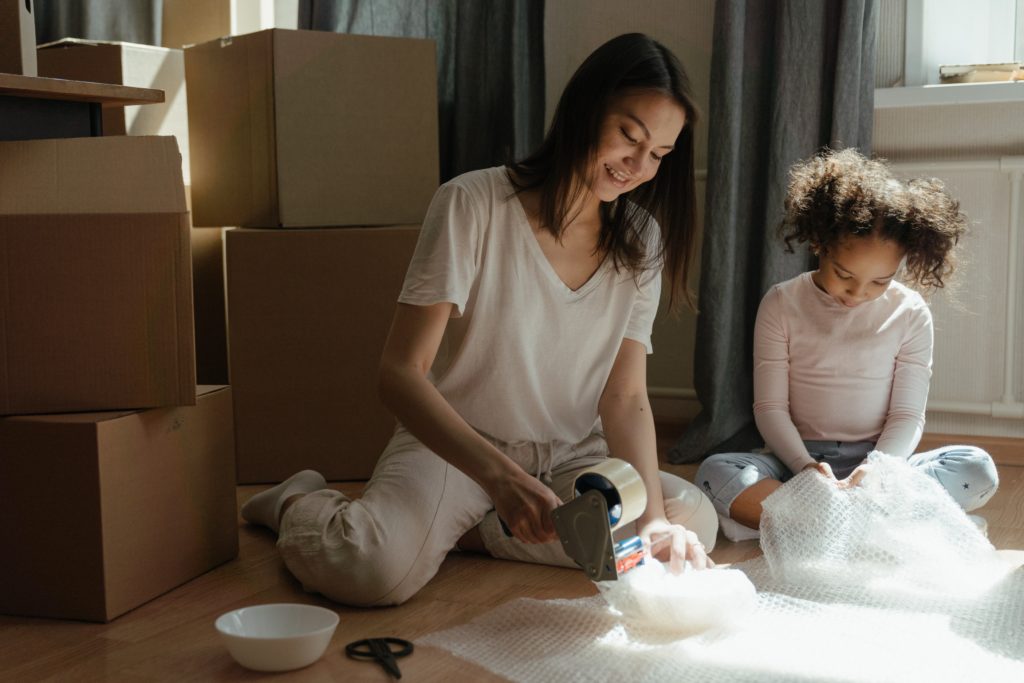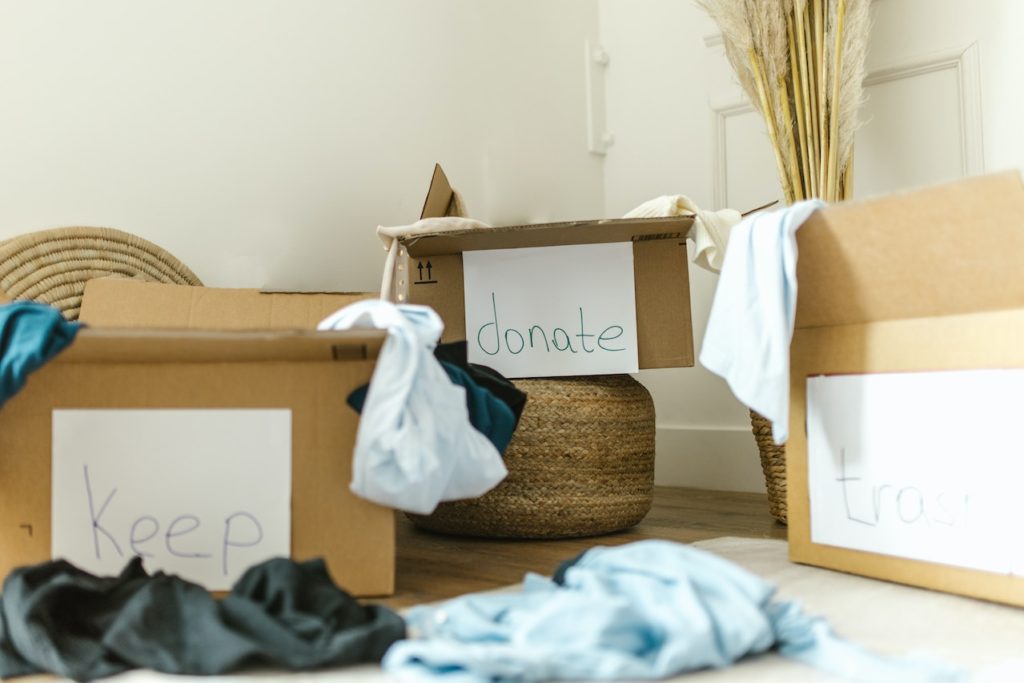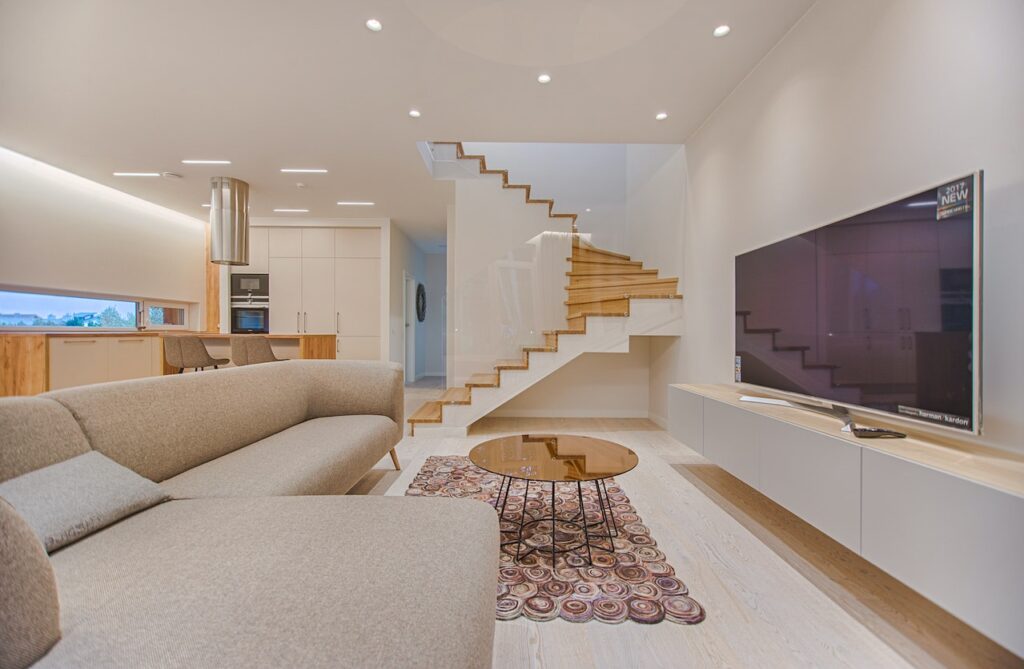
My guest blogger is Sophia Perry from Arizona Moving Professional
Before we dive in, let’s take a moment to reflect on why decluttering your home is so important. For starters, cluttered living spaces can have a negative impact on your mental health, causing feelings of anxiety and being overwhelmed. On the other hand, a tidy home can promote feelings of calm, relaxation, and happiness. A clutter-free space can also increase your productivity and creativity, making it easier to focus on the things that matter most to you. It’s a fantastic feeling to purge unwanted items and create a clean and organized space. However, maintaining that momentum and preventing clutter from creeping back in is the real challenge. Don’t worry! Whether you’re a decluttering pro or just starting, this guide will provide practical tips and expert advice on maintaining momentum after decluttering your home to help you keep your home clutter-free. Let’s get started!
#1 Set boundaries for what enters your home
The first step in maintaining a decluttered home is to set boundaries for the items you allow into your space. When shopping or accepting gifts, consider whether the item will add value to your life or just take up space. Creating a rule such as “one item in, one item out” can also help prevent accumulation.
Another useful strategy is to implement a waiting period before making any new purchases. If you see something you like, wait a few days before purchasing it. During this time, you can evaluate if the item is truly essential or if it’s just a passing phase. If you find that you still want the item after the waiting period, you can feel more confident that it’s a worthwhile purchase.

#2 Maintain your space daily
Keep up with daily maintenance to prevent clutter from building up. One of the biggest mistakes people make is giving up decluttering once they are finished with it. Therefore, take a few minutes each day to tidy up and put things away. This can be as simple as making your bed in the morning or quickly sweeping your living space before bed. By taking these small steps consistently, you’ll prevent clutter from accumulating and ensure that your space stays clean and organized.
Another useful strategy is to implement a system for organizing your belongings. This can include using storage bins, labels, and drawer dividers to keep everything in its place. Having designated spots for your possessions makes putting things away easier and prevents them from getting lost in the shuffle.
#3 Set aside things that are not important
There is no better way to maintain momentum after decluttering than by donating things that are not important to you. It’s easy to feel like every item in your home is essential, but in reality, some things are less necessary than others. For example, do you really need five sets of sheets for your bed, or could you make do with two? If you feel 5 sets of sheets are important find storage space for 3 sets of sheets in another area until you need them. Keeping only 2 sets of sheets in your linen closet can help prevent it from becoming cluttered again. Keep the important items easily accessible and consider how many duplicates you need to keep. Duplicates create clutter.
One way to create space for less important things is to prioritize your belongings. Think about what items you use daily versus what items you only use occasionally. Store the occasional-use items in a less accessible place, such as a high shelf or a storage closet, or rent a storage unit. This will help prevent them from taking up valuable real estate in your home.
Regularly reevaluate your possessions and donate items that no longer serve you. This can be a challenging task, but it’s essential for maintaining a clutter-free home.
#4 Set a regular cleaning schedule
Establishing a regular cleaning schedule is important for maintaining momentum after decluttering your home. This will help maintain the sense of space and organization you’ve created. By setting aside a few hours each week to clean, you can prevent clutter from accumulating and keep your home feeling fresh and tidy.
Start by creating a checklist of cleaning tasks that need to be done regularly. Assign these tasks to specific days of the week or month. Make sure to mark them on your calendar or planner so you don’t miss them. You can also enlist the help of family members or roommates to share the cleaning responsibilities. Create a chore chart and assign tasks to each person, making sure to rotate them regularly so that everyone gets a chance to do different tasks.

#5 Don’t clutter it, donate it!
Aren’t you tired of cluttering your house with things you don’t even need? Wouldn’t it be better to donate them to someone who could appreciate them? Creating a donation system is an excellent way to maintain momentum after decluttering your home. Not only will you be doing something good for others, you’ll also be reducing clutter in your home.
Set a date and time to drop off or have your donations picked up, and mark it on your calendar. This will help you stay accountable and ensure that your items don’t just sit around your home, taking up space.

#6 Embrace minimalism
Can you embrace minimalism as a way of life? Minimalism isn’t just about having fewer possessions. It’s a mindset that can help you live a more intentional and fulfilling life. By focusing on the things that truly matter to you and letting go of the rest, you’ll create more space, time, and energy for the things that bring you joy.
Embracing minimalism also means being mindful of your consumption habits. Rather than constantly buying new things, focus on using and appreciating what you already have. When you do make purchases, invest in high-quality items that will last for years rather than cheap, disposable products that will clutter up your home.
Final thoughts
Congratulations! You’ve succeeded in decluttering your home and creating a new sense of space and organization. But the work doesn’t stop there! Maintaining momentum after decluttering your home is just as big of a task. In the end, decluttering is a journey, not a destination. It’s a continuous process of letting go, simplifying, and making room for less clutter and more joy in your life. And with the tips and tricks outlined in this guide, you’ll be well on your way to maintaining momentum and enjoying the benefits of a clutter-free home.
I think Sophia Perry has created a good guide. What would you add to this guide? Leave me a comment.

Julie Stobbe is a Trained Professional Organizer and Lifestyle Organizing Coach who brings happiness to homes and organization to offices, virtually using Zoom. She has been working with clients since 2006 to provide customized organizing solutions to suit their individual needs and situation. She uses her love of teaching to reduce clutter, in your home, office, mind and time. She guides and supports you to be accountable for your time, to complete projects and reach your goals. If you’re in a difficult transition Julie can coach you to break-free of emotional clutter constraining you from living life on your terms. Online courses are available to help instruct, coach and support your organizing projects. Get started by downloading Tips for Reorganizing 9 Rooms.
Click here to learn more about her online course Create an Organized Home.
Twitter – Facebook – Facebook group Organizing Mind and Space
Click here to learn more about working with a Professional Organizer.

Reading about decluttering and the tips for doing so cause me to feel the calm and space. Thank you for sharing this Julie.
Decluttering has a big impact on mental wellness. It can help relieve anxiety and stress and you new space can give you a feeling of calmness.
It’s also important to maintain momentum DURING the decluttering process! How often do people start the job, only to run out of time or energy before it gets finished. This can be worse than it was before, because clutter that was previously tucked away in closets or drawers is now out in the open!
I agree with your comment that keeping momentum during the job is important. Leaving things in a worse condition than you started makes people ask, “why bother?” I am currently working with a client helping her keep momentum for her organizing project and maintaining that part that is completed. She is on week 65 of her project and still going strong. Working with an organizer virtually works!
There’s no question how clutter can negatively impact how we feel about being in our space. The sense of relief my clients experience after they declutter is palpable. Sophia’s suggestions are solid.
My client’s also feel a sense of relief when the clutter is undercontrol and they know how to keep things that way. The sense of relief, accomplishment and wellbeing that comes to your life after decluttering is wonderful.
These are all great tips. I tell clients being organized is a journey not a destination. And, it’s a life-long process. Just as we work to stay fit and healthy, we work to maintain the organization in our homes. Creating daily routines and habits is a great way to remain clutter-free.
I completely agree with your comment that it is daily activities that help people to stay organized rather than doing it once and being done. Life changes, your needs change and so does how you organize what you need in each phase of your life.
As I get older, I seem to becoming more and more of a minimalist. Part of this is because, in working with clients, I see the true weight that physical belongings can have. Another reason is because I just need/want less. Most of my acquisitions these days are replacements, rather than the “latest and greatest.” I have learned that even if I do buy the latest fashion, I still won’t really be fashionable LOL!
A system for donation is so good. If we don’t have that established in an ongoing fashion, then decluttering feels like a “big project” instead of a fairly easy part of daily living.
Yes a system for donations makes decluttering easy. Thank you for that comment.
I agree with all of these points, but especially the importance of maintenance. Decluttering is an ongoing adulting skill, like doing laundry, and while we’ll never be “finished,” the more maintenance we do (and the more cautious we are about what is coming in), the easier it will get.
I think you may have to be the right personality to embrace minimalism; after all, I’m a professional organizer, and I still find it too austere. But overall, Sophia’s points are apt!
I like that you said, “decluttering is an adult skill”. There are so many things in life that need to be done to make our lives better, eating well, doing laundry, cleaning the home and decluttering. As it becomes part of your life everyday or week the job becomes smaller until you don’t realise you have to do it, it just gets done.
All great ideas. It amazes me how many people are seeking more and more help to declutter their homes.
I saw in one of shows one time this woman who kept on buying online every time she got an email with a discount coupon. She ended up with mountains of bags of toys, clothes, shoes and a lot more. After decluttering, she unsubscribed from a lot of different website in order to minimize her desire to own every single items that pops on her screen. Having a problem and admitting that she had it was a big deal.
I loved your ultimate rule “one piece in, one piece out”
Online shopping makes lots of clutter for my clients. First you have the item, then all the packaging to clean up and then returns to make. Understanding that online shopping takes time and does not necessarily save you time is an important consideration for what comes into your home. Thanks for commenting on “the shopping problem” and that people need to examine if they have one or not.